| Politics of Jersey |
|---|
 |
| Category |
A by-election for a Senator to the States of Jersey was held on 7 September 2016, after the resignation of Zoe Cameron on 12 July 2016.
| Politics of Jersey |
|---|
 |
| Category |
A by-election for a Senator to the States of Jersey was held on 7 September 2016, after the resignation of Zoe Cameron on 12 July 2016.
| Party | Candidate | Votes | % | ±% | |
|---|---|---|---|---|---|
| Independent | Sarah Ferguson | 3,649 | 29.7 | ||
| Reform Jersey | Sam Mézec | 3,518 | 28.6 | ||
| Independent | Christian May | 2,018 | 16.4 | ||
| Independent | John Young | 1,240 | 10.1 | ||
| Independent | Hugh Raymond | 988 | 8.0 | ||
| Independent | Guy de Faye | 254 | 2.1 | ||
| Independent | Mary O'Keeffe-Burgher | 246 | 2.0 | ||
| Independent | Nick Le Cornu | 139 | 1.1 | ||
| Independent | Alvin Aaron | 103 | 0.8 | ||
| Independent | Mike Dun | 73 | 0.6 | ||
| Independent | Stevie Ocean | 70 | 0.6 | ||
| Majority | 131 | 1.1 | |||
| Turnout | 12,298 | 19.1 | |||
| Registered electors | 64,462 | ||||
| Independent hold | Swing | ||||

The 2000 United States presidential election was the 54th quadrennial presidential election, held on Tuesday, November 7, 2000. The Republican nominee, Governor George W. Bush of Texas, the eldest son of George H. W. Bush, narrowly defeated incumbent Democratic Vice President Al Gore. It was the fourth of five U.S. presidential elections, and the first since 1888, in which the winning candidate lost the popular vote, and is considered one of the closest U.S. presidential elections, with long-standing controversy about the result. Gore conceded the election on December 13.
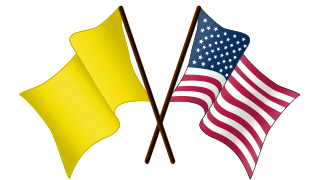
The Libertarian Party (LP) is a classical liberal political party in the United States that promotes civil liberties, non-interventionism, laissez-faire capitalism, and limiting the size and scope of government. The party was conceived in August 1971 at meetings in the home of David F. Nolan in Westminster, Colorado, and was officially formed on December 11, 1971, in Colorado Springs. The organizers of the party drew inspiration from the works and ideas of the prominent Austrian school economist Murray Rothbard. The founding of the party was prompted in part due to concerns about the Nixon administration, the Vietnam War, conscription, and the introduction of fiat money.

The Republican Party, also known as the GOP, is one of the two major contemporary political parties in the United States. It emerged as the main political rival of the then-dominant Democratic Party in the mid-1850s, and the two parties have dominated American politics ever since.
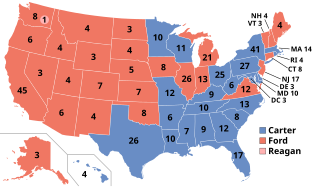
The 1976 United States presidential election was the 48th quadrennial presidential election, held on Tuesday, November 2, 1976. The Democratic nominee, former Georgia governor Jimmy Carter, narrowly defeated incumbent Republican President Gerald Ford. This was the first presidential election since 1932 in which the incumbent was defeated, as well as the only Democratic victory of the six presidential elections between 1968 and 1988.

In the United States, the Electoral College is the group of presidential electors that is formed every four years during the presidential election for the sole purpose of voting for the president and vice president. The process is described in Article II of the U.S. Constitution. The number of electoral votes a state has equals its number of Senators (2) plus its number of Representatives in the House of Representatives, the latter being dependent on the Census's reported population. Each state appoints electors using legal procedures determined by its legislature, equal in number to its congressional delegation totaling 535 electors in the 50 states. A 1961 amendment granted the federal District of Columbia three electors, bringing the total number of electors to 538. Federal office holders, including senators and representatives, cannot be electors. Of the current 538 electors, a simple majority of 270 or more electoral votes is required to elect the president and vice president. If no candidate achieves a majority there, a contingent election is held by the House of Representatives to elect the president and by the Senate to elect the vice president.

In American politics, a swing state is any state that could reasonably be won by either the Democratic or Republican candidate in a statewide election, most often referring to presidential elections, by a swing in votes. These states are usually targeted by both major-party campaigns, especially in competitive elections. Meanwhile, the states that regularly lean to a single party are known as "safe states", as it is generally assumed that one candidate has a base of support from which a sufficient share of the electorate can be drawn without significant investment or effort by the campaign.
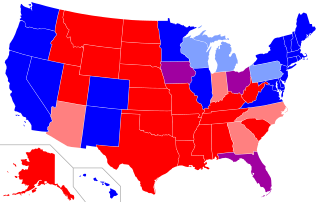
Starting with the 2000 United States presidential election, the terms "red state" and "blue state" have referred to US states whose voters vote predominantly for one party—the Republican Party in red states and the Democratic Party in blue states—in presidential and other statewide elections. By contrast, states where the vote fluctuates between the Democratic and Republican candidates are known as "swing states" or "purple states". Examining patterns within states reveals that the reversal of the two parties' geographic bases has happened at the state level, but it is more complicated locally, with urban-rural divides associated with many of the largest changes.

Jill Ellen Stein is an American physician and activist. She is the Green Party's nominee for president of the United States in the 2024 election, and was previously its candidate in the 2012 and 2016 elections. She was the Green-Rainbow Party's candidate for governor of Massachusetts in 2002 and 2010. Stein is among the list of several women who have run for President of the United States and also one of the few who received over a million votes in the general election behind both Hillary Clinton and Jo Jorgensen.
An independent, non-partisan politician or non-affiliated politician is a politician not affiliated with any political party or bureaucratic association. There are numerous reasons why someone may stand for office as an independent.
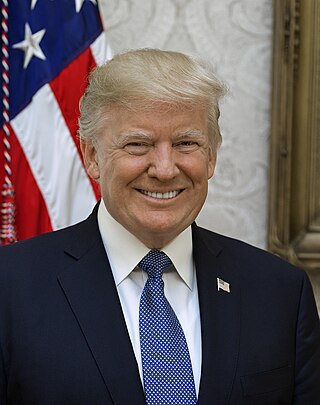
Donald John Trump is an American politician, media personality, and businessman who served as the 45th president of the United States from 2017 to 2021.
The Labour Party is a social democratic political party in the United Kingdom that sits on the centre-left of the political spectrum. In a broader sense, the party has been described as an alliance of social democrats, democratic socialists and trade unionists. It is the governing party of the United Kingdom, having won the 2024 general election, and is currently the largest political party by number of votes cast and number of seats in the House of Commons. There have been seven Labour prime ministers and fourteen Labour ministries. The party traditionally holds the annual Labour Party Conference during party conference season, at which senior Labour figures promote party policy.

The 2012 United States presidential election was the 57th quadrennial presidential election, held on Tuesday, November 6, 2012. Incumbent Democratic President Barack Obama and his running mate, incumbent Vice President Joe Biden, were elected to a second term. They defeated the Republican ticket of former Governor of Massachusetts Mitt Romney and U.S. Representative Paul Ryan of Wisconsin.

The 2016 United States presidential election was the 58th quadrennial presidential election, held on Tuesday, November 8, 2016. The Republican ticket, businessman Donald Trump and Indiana governor Mike Pence, defeated the Democratic ticket of former secretary of state and First Lady of the United States Hillary Clinton and the junior senator from Virginia, Tim Kaine, in what was considered one of the biggest political upsets in American history. It was the fifth and most recent presidential election in which the winning candidate lost the popular vote. It was also the sixth and most recent presidential election in U.S. history in which both major party candidates were registered in the same home state; the others have been in 1860, 1904, 1920, 1940, and 1944.

The election of the president and the vice president of the United States is an indirect election in which citizens of the United States who are registered to vote in one of the fifty U.S. states or in Washington, D.C., cast ballots not directly for those offices, but instead for members of the Electoral College. These electors then cast direct votes, known as electoral votes, for president, and for vice president. The candidate who receives an absolute majority of electoral votes is then elected to that office. If no candidate receives an absolute majority of the votes for president, the House of Representatives elects the president; likewise if no one receives an absolute majority of the votes for vice president, then the Senate elects the vice president.

The 2016 United States elections were held on Tuesday, November 8, 2016. Republican nominee Donald Trump defeated Democratic former Secretary of State Hillary Clinton in the presidential election, while Republicans retained control of Congress. This marked the first and most recent time Republicans won or held unified control of the presidency and Congress since 2004.
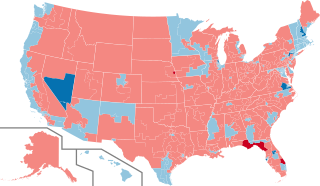
The 2016 United States House of Representatives elections were held on November 8, 2016, to elect representatives for all 435 congressional districts across each of the 50 U.S. states to the 115th United States Congress. Non-voting members for the District of Columbia and territories of the United States were also elected. These elections coincided with the election of President Donald Trump, although his party lost seats in both chambers of Congress. The winners of this election served in the 115th Congress, with seats apportioned among the states based on the 2010 United States census. In October 2015, the House elected a new Speaker, Republican Paul Ryan, who was re-elected in the new term. Democrat Nancy Pelosi continued to lead her party as Minority Leader. Elections were also held on the same day for the U.S. Senate, many governors, and other state and local elections.

The 2020 United States presidential election was the 59th quadrennial presidential election, held on Tuesday, November 3, 2020. The Democratic ticket of former vice president Joe Biden and the junior U.S. senator from California Kamala Harris defeated the incumbent Republican president, Donald Trump, and vice president, Mike Pence. The election took place against the backdrop of the global COVID-19 pandemic and related recession. The election saw the highest voter turnout by percentage since 1900, with each of the two main tickets receiving more than 74 million votes, surpassing Barack Obama's record of 69.5 million votes from 2008. Biden received more than 81 million votes, the most votes ever cast for a candidate in a U.S. presidential election.

The 2016 United States presidential election in Pennsylvania took place on November 8, 2016, as part of the 2016 United States elections in which all 50 states and the District of Columbia participated. Pennsylvania voters chose electors to represent them in the Electoral College via a popular vote.

The Russian government conducted foreign electoral interference in the 2016 United States elections with the goals of sabotaging the presidential campaign of Hillary Clinton, boosting the presidential campaign of Donald Trump, and increasing political and social discord in the United States. According to the U.S. intelligence community, the operation—code named Project Lakhta—was ordered directly by Russian president Vladimir Putin. The "hacking and disinformation campaign" to damage Clinton and help Trump became the "core of the scandal known as Russiagate". The 448-page Mueller Report, made public in April 2019, examined over 200 contacts between the Trump campaign and Russian officials but concluded that there was insufficient evidence to bring any conspiracy or coordination charges against Trump or his associates.